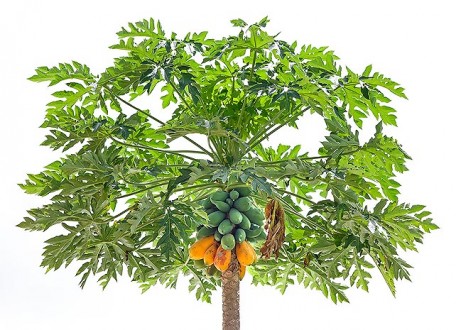Papaya Leaf
- The papaya plant – also called pawpaw in Australia and known scientifically as Carica papaya – is most widely known for its delicious orange fruit. Native to Southern Mexico and the Carribean, papaya now grows throughout most tropical and subtropical countries in the world. Papaya leaf tea may have a number of health benefits including potent antioxidant properties when taken regularly.
Contents
Benefits
- Cancer: Papaya leaf tea has been used in tropical regions to treat a number of ailments and recent scientific data suggests that papaya leaf may be useful in fighting cancer. According to research published in the Journal of Ethnopharmacology in February of 2010, papaya leaf tea showed promise in treating a variety of human cancers in vitro including cervical, breast, lung and pancreatic cancers. Scientists posit that the anticancer effects of papaya leaf tea may be due to the stimulation of immune cells that kill cancer cells. University of Florida researcher Dr. Nam Dang, one of the team members responsible for the study, elaborated on the university’s website that papaya leaf tea demonstrated no toxicity on human cells, potentially making it a safe, natural treatment for many forms of cancer.
- Ulcers: Papaya leaf tea may also be a benefit for gastric ulcers, according to research published in “The West Indian Medical Journal” in September 2008. Researchers found that papaya leaf tea prevented gastric ulcers in rats subjected to alcohol compared to the control group. Further, the rats pre-treated with papaya leaf showed less oxidative stress in their blood, suggesting that papaya leaf tea had a strong systemic antioxidant effect. Researchers attributed the reduction in ulcer formation and oxidative stress – at least in part – to an increase in glutathione peroxidase activity – an important antioxidant function that prevents free radical-damage in the body.
- Antioxidant: Other research suggests that papaya leaf may reduce hydrogen peroxide – a marker for oxidative damage. Research published in the Asian Pacific Journal of Tropical Biomedicine in June 2012 showed that while papaya leaf tea did not demonstrate as many antioxidant properties as ascorbic acid, scientists still concluded that it may have potential pharmacological and nutritional benefits in preventing or reducing free radical-damage.
- Papaya also contains a chemical called carpain. Carpain seems to be able to kill certain parasites, and it might affect the central nervous system.
Cautions
- Pregnancy and breast-feeding: Papaya is POSSIBLY UNSAFE when taken by mouth during pregnancy. Do not take papaya by mouth in medicinal amounts if you are pregnant. There is some evidence that unprocessed papain, one of the chemicals found in papaya, might poison the fetus or cause birth defects. Not enough is known about the safety of papaya during breast-feeding. It is best to avoid taking it in amounts higher than normal food amounts.
- Diabetes: Papaya that has been fermented can lower blood sugar. People with diabetes who are taking medications to lower their blood sugar should pay close attention to their blood sugar as adjustments to medications might be needed.
- Low blood sugar: Papaya that has been fermented can lower blood sugar. Taking this form of papaya might make blood sugar too low in people who already have low blood sugar.
- Papain allergy: Papaya contains papain. If you are allergic to papain, avoid eating papaya or taking products that contain papaya.
- Latex allergy: If you are allergic to latex, there is a good chance you are also be allergic to papaya. If you have a latex allergy, avoid eating papaya or taking products that contain papaya.
- Surgery: Papaya that has been fermented can lower blood sugar. In theory, this form of papaya might affect blood sugary during and after surgery. If you are taking papaya, you should stop 2 weeks before surgery.
Other Names
Banane de Prairie, Caricae Papayae Folium, Carica papaya, Carica peltata, Carica posoposa, Chirbhita, Erandachirbhita, Erand Karkati, Green Papaya, Mamaerie, Melonenbaumblaetter, Melon Tree, Papaw, Papaya Fruit, Papayas, Papaye, Papaye Verte, Papayer, Papita.
References
- Source: WebMD, “Papaya Leaf”, www.webmd.com/vitamins-supplements/
- Source: Myszko, Amy; “Papaya Leaf Tea Benefits”, Demand Media, healthyeating.sfgate.com/papaya-leaf-tea-benefits-10422.html

